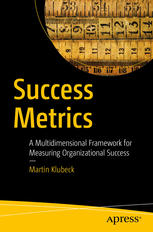

Most ebook files are in PDF format, so you can easily read them using various software such as Foxit Reader or directly on the Google Chrome browser.
Some ebook files are released by publishers in other formats such as .awz, .mobi, .epub, .fb2, etc. You may need to install specific software to read these formats on mobile/PC, such as Calibre.
Please read the tutorial at this link: https://ebookbell.com/faq
We offer FREE conversion to the popular formats you request; however, this may take some time. Therefore, right after payment, please email us, and we will try to provide the service as quickly as possible.
For some exceptional file formats or broken links (if any), please refrain from opening any disputes. Instead, email us first, and we will try to assist within a maximum of 6 hours.
EbookBell Team

4.8
84 reviewsStep through the process of identifying and combining the right measures to gauge, narrate, and guide your organization's progress toward true success. All organizations have a common goal to be successful. All leaders want to make data-informed decisions and use measures to improve processes, communicate progress, and gain support. The problem is that proxy or partial measures don’t measure overall success and can be misleading. They measure performance parameters, progress on a specific task, customer feedback, and other piecemeal indices—which taken separately fail to describe an organization’s progress toward overall success.
To measure success, leaders today are missing a key meta-analytic in their toolbox. In this book, metrics consultant Martin Klubeck provides it to them. Success Metrics shows organizational leaders how to measure success at the individual and organizational levels. By measuring success in multiple dimensions using multivariate methods you will be able to determine what works and what doesn’t. The key is to measure and promote progress in terms of organizational vision, mission, and overarching goals.
Business leaders too often succumb to the working assumption that they only have to show shareholders and boards of trustees that they are turning a profit—the higher the profit, the more successful their stewardship of the company. Wrong! To truly thrive and endure, all organizations—corporate, government, small, large, nonprofit, or startup—need to define and pursue the underlying purpose for their existence.
The author's integrated measures of success can be used to communicate organizational progress to stakeholders, shareholders, boards of trustees, corporate leaders, the workforce, and the customer base and thereby galvanize broad commitment to organizational success. Klubeck shows how his principles and methods of measuring overall success can be applied at all levels: individual, team, group, department, division, and organization.